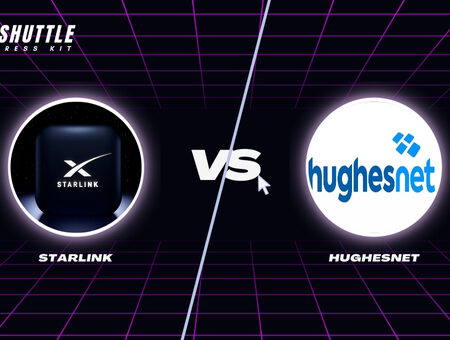Ever found yourself wondering which satellite internet service to choose? When it comes to Starlink vs HughesNet, it’s not just about picking an internet provider; it’s about choosing the bridge that connects you to the vast digital world.
Both have their advantages, sure, but there’s only one that could potentially revolutionize your online experience. Stick around as we dive deep into this ultimate showdown and make your decision a tad easier.
In the grand scheme of things, Starlink often takes the lead over HughesNet for those in need of faster speeds and lower latency. With its ever-expanding network of low Earth orbit satellites, Starlink aims to provide high-speed internet across even the most remote corners of the planet.
Meanwhile, HughesNet offers reliable service with no hard data limits but tends to fall behind when it comes to speed and latency in comparison. However, geography and personal usage needs can greatly influence which option is best suited for you.
| Feature | Starlink | HughesNet |
|---|---|---|
| Plan Costs | $120–$5000/mo | $49.99–$79.99/mo |
| Hardware Fee | One-time $599 or $2,500 | No specific fee mentioned |
| Speed Range | 20-220Mbps | 50-100Mbps |
| Data Policy | Unlimited Standard Data | Unlimited data, with restrictions after cap |
| Nationwide Availability | Yes | Yes |
| Maximum Speeds | 1Gbps (projected) | 25Mbps |
| Average Speeds | 900Mbps (projected) | 14Mbps |
| High-speed Data Cap | TBD | 20-100GB |
| Price | $80/mo (projected) | $60-150/mo |
| Reliability | Superior (projected) | Average |
Comparing Starlink and HughesNet: An Overview
The choice between Starlink and HughesNet involves a nuanced comparison of their respective offerings in satellite internet services, each with its unique advantages.

On one hand, Starlink positions itself as a high-end service provider, with plan costs significantly higher than HughesNet, ranging from $120 to $5000 per month, plus an upfront hardware fee. This is contrasted by HughesNet’s more budget-friendly approach with monthly plans priced between about $50 and $80.
Performance-wise, Starlink boasts impressive speeds that dwarf those of HughesNet; it anticipates average speeds around 900Mbps and stretches the envelope towards the 1Gbps mark.
Such performance comes at a steep price but promises groundbreaking levels of reliability and an unlimited data policy to cater to heavy internet users.
Meanwhile, HughesNet provides a stable yet slower alternative at up to 25Mbps max speed and implements a fair use policy limiting high-speed data usage before throttling speeds but still affords unlimited overall data usage. This overview illustrates the trade-offs between cost and performance when choosing between these two satellite internet giants.
Also Read: Starlink vs Viasat: Which Satellite Is Right for You?
Ideal Users for Selecting Starlink
Starlink emerges as a prime choice for individuals and businesses seeking robust, high-speed internet connectivity, particularly in areas where traditional broadband services are unreliable or unavailable.
With its promise of speeds ranging from 20 to 220Mbps, extending up to a projected 900Mbps in certain areas, Starlink caters remarkably well to users with demanding online activities. This includes remote workers, avid gamers, and households with high streaming or downloading needs.
Furthermore, the prospect of nationwide availability and unlimited standard data without strict caps makes Starlink an attractive option for users in rural or underserved locations.
Those prepared to invest in superior internet reliability won’t balk at the higher upfront hardware cost or monthly plan rates compared to options like HughesNet. For users where cutting-edge technology and uninterrupted connectivity take precedence over budget constraints, Starlink stands out as the superior choice.
Ideal Candidates for HughesNet Internet Service
HughesNet positions itself as an attractive option for individuals living in remote or rural areas where traditional broadband access is limited.
With nationwide availability and plans that cater to a range of budget considerations, starting at $49.99 to $79.99 per month, HughesNet fits well for users prioritizing reliable basic internet services without the need for high-speed demands.
The inclusion of unlimited data—with restrictions only applying after reaching a certain cap—ensures that users can continue their online activities without worrying about completely losing access once they exceed their plan limits.
Given its maximum speed cap at 25Mbps, HughesNet is particularly suited for smaller households or users with moderate internet needs, such as browsing, emailing, and standard-definition video streaming. Its straightforward offerings make it a solid choice for those seeking straightforward connectivity solutions without the bells and whistles associated with higher-priced alternatives like Starlink.
Budget-conscious consumers who can manage within the defined high-speed data caps provided will find HughesNet a cost-effective solution to stay connected in areas with few other options.
Starlink vs HughesNet – Plans and Pricing
When it comes to choosing satellite internet services, two names frequently surface: Starlink, founded by SpaceX, and HughesNet, a veteran in the field.

An essential aspect that influences consumer choice is the plans and pricing offered by each provider.
Starlink Plans
| Service Level | Price Range | Connection Speeds | Initial Equipment Fee | Data Provision |
|---|---|---|---|---|
| Basic Service | $120 | 25-220 Mbps | $599 | Unlimited (standard) |
| Enhanced Access | $140 to $500 | 25-220 Mbps | $2,500 | 40GB to 2TB, then unlimited |
| Nomadic | $150 to $200 | 25-220 Mbps | $599 | Unlimited (standard) |
| Nomadic Plus | $250 to $5,000 | 25-220 Mbps | $2,500 | 50GB to 5TB, then unlimited |
HughesNet Plans
| Plan | Price | Maximum Speed | Data Policy |
|---|---|---|---|
| Select | $49.99/mo | 50Mbps | No Cap |
| Elite | $64.99/mo | 100Mbps | No Cap |
| Fusion | $79.99/mo | 100Mbps | No Cap |
Also Read: Standard vs High Performance Starlink: Differences Explored
User Experience with Starlink vs HughesNet
When we talk about what it’s like to use Starlink and HughesNet, there’s a lot to think about. Both offer tools for getting online, but they do it in their ways. From how easy they are to figure out, to the help you get when you’ve got a question, right down to the rules on how much data you can use – each service has its feel.
Ease of Use
Starlink and HughesNet both aim to make your life easier with neat interfaces and useful gadgets. For Starlink, many people say that setting up is simple – you get a kit with everything in one box.
Their app is quite helpful too; it shows you where to set up your dish for the best view of the sky. On the other hand, HughesNet offers a standard modem and satellite dish setup; users say that after installation, it’s pretty much just plug-and-play.
Customer Service Ratings
When things go wrong or just when you need an answer, good customer support can be golden. For Starlink, finding help might mean looking through their FAQs or sending them an email because they don’t have a call center yet.
Some folks aren’t happy with this email-only approach. But then there’s HughesNet, which has mixed reviews: some people find them very helpful over the phone while others feel let down by slow responses.
Data Policy
The rules for how much data you can use before things slow down matter if you’re on the internet a lot! Starlink is pretty cool here; they don’t have any strict limits on data yet – no throttling as tech folks say – but they do mention there might be slower speeds during busy hours if lots of people are online at once.
In contrast, HughesNet sets clear limits depending on your plan and your speeds will dive if you hit that cap before the month resets.
Also Read: Does Starlink Work Well In Bad Weather? Unveiled Truth!
Frequently Asked Questions
Is Starlink better than HughesNet?
Yes, in many cases, Starlink is considered better than HughesNet due to its lower latency, higher download/upload speeds due to its low-Earth orbit satellite network. However, experiences may vary based on location and other factors.
What is better than Starlink?
As of my last update in early 2023, there isn’t a widely available consumer service that surpasses Starlink in terms of speed and latency for satellite internet. However, fiber-optic services like Google Fiber or Verizon Fios might offer superior performance where available.
What is better than HughesNet?
Aside from Starlink, traditional broadband services (fiber-optic, cable) are generally faster and more reliable options compared to HughesNet if they’re available in your area. Viasat is another satellite internet option that might offer competitive plans depending on your needs.
How is Starlink different from traditional satellite internet?
Starlink utilizes a constellation of low-Earth orbit (LEO) satellites, significantly reducing latency and increasing speeds compared to traditional geostationary satellite internet providers like HughesNet or Viasat that operate from much higher altitudes.
Also Read: Guide to Stow Your Starlink: The Art of Satellite Setup
Conclusion
Choosing between Starlink and HughesNet comes down to what you value most. If you’re looking for faster speeds and more cutting-edge technology, Starlink may be the better bet.
However, if coverage in remote areas and a proven track record are your top priorities, HughesNet has got your back with its wider availability. Prices and additional costs can be a deciding factor too, especially when budgeting for monthly expenses is crucial.
Mandatory equipment purchases or rentals and data policies should also influence your decision. Both providers have their pros and cons depending on weather impacts and future tech updates that could change the game entirely. So weigh each aspect carefully before committing to what works best for your specific needs.
